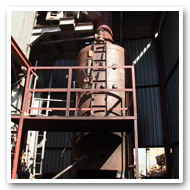HEAT TREATING PLANT REGISTRATION: ZA-J01/HT To ensure that our customers get the very best quality wood products and pallets we heat treat all of our products as a form of pest control. We treat all pallets at a temperature of 56°C for 30 minutes which is the perfect temperature to eradicate a wide range of pests, making this a viable treatment to keep our products in top shape for our customers. This treatment is also in accordance with the ISPM-15 requirements.
HEAT TREATING PLANT REGISTRATION: ZA-J01/HT
Pest Groups and Insects the heat treatment targets
|
- Anobiidae
- Anobiidae forms part of the beetle family. This species has earned the name “woodworm” due to the larvae’s tendency to eat through wood. This species has been known to damage wooden furniture and housing.
- Buprestidae
- Buprestidae also forms part of the beetle family. More commonly known as “jewel beetles” or “metallic wood-boring beetles” these insects can be identified by their glossy rainbow-like and lustrous colours. There are over 15 000 species of this beetle.
- Curculionidae
- Curculionidae is part of the family of the "true" weevils or "snout beetles". They can be identified by their distinctive long snout and are almost entirely plant eaters.
- Lyctidae
- Also known as Powderpost beetles, these insects form part of a group of seventy species of woodboring beetles. These beetles feed mainly off trees, turning the wood to a dusty powder, hence earning the name “Powderpost” beetle.
- Scolytidae
- More commonly known as the “bark beetle”, there are over 6000 Scolytidae beetles. It was recently discovered that “bark beetles” are members of the “true weevil” family. These beetles are considered to be vital to ecology as they aid in the decomposition of dead wood. However, in the timber industry, their decompositions skills are less than desirable.
- Bostrichidae
- The Bostrichidae family of beetles are called “Auger beetles” or “false or horned powderpost beetles”. This beetle’s head is hidden by its thorax, which is its most identifiable trait
- Cerambycidae
- Known as the longhorn beetles, these insects can be easily identified by their antenna, which are longer than the length of their actual body.
- Isoptera
- The common name for this insect is Termites. Termites feed mostly on dead plant matter. Making timber a huge target for these creatures.
- Oedemeridae
- The family Oedemeridae is part of a group called “false blister beetles” or “pollen-feeding beetles”. There are over 1,500 species in this family. The larvae of this species enjoys feeding on rotting wood, making timber an attraction for this insect.
- Siricidae
- Known as the Horntail or wood wasp, this insect is part of a 150 species family. The wasp of this species lays its eggs inside wood, thus when the larvae hatch they feed off the timber.
|




